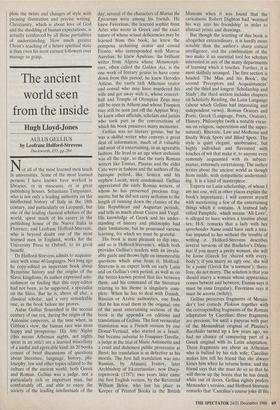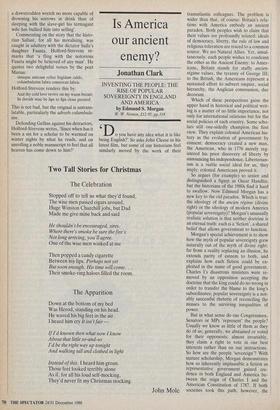The ancient world seen from the inside
Hugh Lloyd-Jones
AULUS GELLIUS by Leofranc Holford-Strevens
Duckworth, £35, pp.284
Not all of the most learned men teach in universities. Some of the most learned persons I have known have worked in libraries, or in museums, or in great publishing houses. Sebastiano Timpanaro, who is not only a leading authority on the intellectual history of Italy in the 18th century, and particularly on Leopardi, but one of the leading classical scholars of the world, spent much of his career in the publishing house of the Nuova Italia in Florence; and Leofranc Holford-Strevens, who is beyond doubt one of the most learned men in England, works for the University Press in Oxford, to its great benefit.
Dr Holford-Strevens admits to acquaint- ance with some 40 languages. Not long ago he copy-edited an important book about Byzantine history and the origins of the Slavic kingdoms; its author expressed asto- nishment on finding that this copy-editor had not been, as he supposed, a specialist on the Slays. But he is, above all else, a classical scholar, and a very remarkable one, as the book before me proves.
Aulus Gellius flourished in the second century of our era, during the reigns of the Antonine emperors, at the time when, in Gibbon's view, the human race was most happy and prosperous. His Attic Nights (this means Athenian nights, not nights spent in an attic) are a learned miscellany of a useful and agreeable kind; its 20 books consist of brief discussions of questions about literature, language, history, phi- losophy, law and other topics related to the culture of the ancient world, both Greek and Roman. Gellius was a judge, not a particularly rich or important man, but comfortably off, and able to enjoy the society of the leading intellectuals of the day; several of the characters of Marius the Epicurean were among his friends. He knew Favorinus, the learned sophist from Arles who wrote in Greek and the exact nature of whose sexual deficiencies may be learned from this book; he knew the pompous archaising orator and consul Fronto, who corresponded with Marcus Aurelius; he knew Apuleius, the brilliant writer from Algeria whose Metamorph- oses, often called the Golden Ass, is the one work of literary genius to have come down from this period; he knew Herodes Atticus, the vastly rich Athenian orator and consul who may have murdered his wife and got away with it, whose concert- hall and Temple of Olympian Zeus may still be seen in Athens and whose Triopion may still be seen just off the Appian Way; he knew other officials, scholars and jurists who took part in the conversations of which his book preserves many memories.
Gellius was no literary genius, but he was a skilful writer who conveys a great deal of information, much of it valuable and most of it entertaining, in an agreeable fashion. He lived in an age when archaism was all the rage, so that the early Roman writers like Ennius, Plautus and the elder Cato were in fashion and the authors of the baroque period, like Seneca and his nephew Lucan, were condemned. Gellius appreciated he early Roman writers, of whom he has preserved precious frag- ments; but he did not carry archaism to the length of running down the classics of the late Republican and Augustan periods, and tells us much about Cicero and Virgil. His knowledge of Greek and his under- standing of history and philosophy had their limitations; but he possessed various learning, for which we must be grateful.
His book is most pleasant to dip into, and so is Holford-Strevens's, which both provides Gelfius's readers with an invalu- able guide and throws light on innumerable questions which arise from it. Holford- Strevens is an expert both on early Latin and on Gellius's own period, as well as on the better-known period that lies between them, and his command of the literature relating to his theme is singularly com- plete. When he has to deal with Danish, Russian or Arabic authorities, one finds that he has read them in the original; one of the most entertaining sections of the book is the appendix on editions and translations of Genius. The first vernacular translation was a French version by one Donze-Verteuil, who started as a Jesuit, but became substitut to Fouquier-Tinville, a judge at the trial of Marie Antoinette and a cruel and dishonest public prosecutor at Brest; his translation is as defective as his morals. The first full translation was into Russian, by Afanasij Ivanov, later Archbishop of Ekaterinoslav, now Dnep- ropetrovsk (1787); two years later came the first English version, by the Reverend William Beloe, who lost his place as Keeper of Printed Books in the British Museum when it was found that the caricaturist Robert Dighton had 'wormed his way into his friendship' in order to abstract prints and drawings.
But though the learning of this book is altogether extraordinary, it is hardly more notable than the author's sharp critical intelligence, and the combination of the two make it an essential tool for scholars interested in any of the many departments of learning which it touches. Further, it is most skilfully arranged. The first section is headed 'The Man and his Book', the second 'Preceptors and Acquaintances' and the third and longest 'Scholarship and Study'; the third section includes chapters on Scholarly Reading, the Latin Language (about which Gellius had interesting and independent views), Roman Orators and Poets, Greek (Language, Poets, Orators), History, Philosophy (with a notable excur- sus on religion, superstition and the super- natural), Rhetoric, Law and Medicine and finally Weak Spots and Blind Spots. The style is quiet elegant, unobtrusive, but highly individual and flavoured with touches of wit that make it, to anyone even remotely acquainted with its subject- matter, extremely entertaining. The author writes about the ancient world as though from inside, with sympathetic understand- ing. It is a kind of masterpiece.
Experts on Latin scholarship, of whom I am not one, will in other places explain the book's importance; I will content myself with mentioning a few of the entertaining things which it contains. A learned lady called Pamphile, which means 'All-Love', is alleged to have written a treatise about sex; H-S. remarks that a lady with her sprechender Name could have such a trea- tise imputed to her without the trouble of writing it. Holford-Strevens describes several versions of the Bachelor's Dilem- ma: if you marry a pretty woman, she will be koine (Greek for 'shared with every- body'); if you marry an ugly one, she will be a poine (Greek for 'a torment); there- fore, do not marry. The solution is that you should marry a woman whose appearance comes betwixt and between; Ennius says it must be stata (regular), Favorinus says it must be uxoria (wifely).
Gellius preserves fragments of Menan- der's lost comedy Plokion together with the corresponding fragments of the Roman adaptation by Caecilius; these fragments are precious, for until a papyrus with part of the Menandrian original of Plautus's Bacchides turned up a few years ago, we had no chance of comparing part of a Greek original with its Latin adaptation. These fragments are about an Athenian who is bullied by his rich wife; Caecilius makes him tell his friend that she always kisses him when he returns home, and the friend says that she must do so so that he will throw up the booze that he has drunk while out of doors. Gellius rightly prefers Menander's version, and Holford-Strevens remarks that `Caecilius's coarse joke ill fits a downtrodden wretch no more capable of drowning his sorrows in drink than of sleeping with the slave-girl his termagant wife has bullied him into selling'.
Commenting on the story that the histo- rian Sallust, for all his moralising, was caught in adultery with the dictator Sulla's daughter Fausta, Holford-Strevens re- marks that 'a fling with the notorious Fausta might be believed of any man'. He quotes two delightful verses by the poet Marius:
sinuque amicam refice frigidam caldo, columbulatim labra conserens labris.
Holford-Strevens renders this by:
And thy cold love revive on my warm breast; In dovish wise be lips to lips close pressed.
This is not bad, but the original is untrans- latable, particularly the adverb columbula- tim.
Defending Gellius against his detractors, Holford-Strevens writes, 'Since when has it been a sin for a scholar to be warmed on winter nights by what he reads, and on unrolling a noble manuscript to feel that all heaven has come down to him?'











































































































 Previous page
Previous page